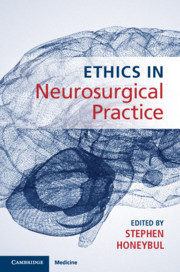Book contents
- Ethics in Neurosurgical Practice
- Ethics in Neurosurgical Practice
- Copyright page
- Contents
- Contributors
- Introduction
- Part I General Ethics
- Chapter 1 Introduction to Ethics and Ethical Theory
- Chapter 2 Models and Methods in Ethics
- Chapter 3 The Concept and Implementation of Values-Based Medicine (VsBM) in Neurosurgery
- Chapter 4 The Three Functions of Consent in Neurosurgery
- Chapter 5 Withholding and Withdrawing Medical Treatment: Legal, Ethical, and Practical Considerations
- Chapter 6 Surgical Training
- Chapter 7 The Aging Surgeon
- Chapter 8 Healthcare Economics
- Chapter 9 Patient Data, Ownership, Storage, and Social Media
- Part II Neurosurgery-Specific Bioethics
- Part III Future Developments
- Index
- References
Chapter 3 - The Concept and Implementation of Values-Based Medicine (VsBM) in Neurosurgery
from Part I - General Ethics
Published online by Cambridge University Press: 29 May 2020
- Ethics in Neurosurgical Practice
- Ethics in Neurosurgical Practice
- Copyright page
- Contents
- Contributors
- Introduction
- Part I General Ethics
- Chapter 1 Introduction to Ethics and Ethical Theory
- Chapter 2 Models and Methods in Ethics
- Chapter 3 The Concept and Implementation of Values-Based Medicine (VsBM) in Neurosurgery
- Chapter 4 The Three Functions of Consent in Neurosurgery
- Chapter 5 Withholding and Withdrawing Medical Treatment: Legal, Ethical, and Practical Considerations
- Chapter 6 Surgical Training
- Chapter 7 The Aging Surgeon
- Chapter 8 Healthcare Economics
- Chapter 9 Patient Data, Ownership, Storage, and Social Media
- Part II Neurosurgery-Specific Bioethics
- Part III Future Developments
- Index
- References
Summary
The concept of values-based medicine is relatively new and can be defined as medical practice that aims at maximizing value, specifically desirable or positive value in every step of a patient’s medical management. It is difficult to disagree with such a benevolent practice; however, problems can arise when attempts are made to clarify the concept of value. Traditionally, medical ethics has focused on the four principles of autonomy, beneficence, non-maleficence, and justice. However, these principles can sometimes be difficult to use in everyday clinical practice. Therefore, acknowledgment of additional values can be helpful to guide practice. Values-based medicine aims to identify a set of intrinsic or instrumental values that are important to a particular individual and to use the values to clinical guide care. A thorough working knowledge evidence-based medicine is required in order to enable a critical evaluation of the evidence presented. It is also important the limitations when applying information obtained from large data sets to individual patients because adopting this approach may fail to recognize and acknowledge the diversity of individual values and goals.
- Type
- Chapter
- Information
- Ethics in Neurosurgical Practice , pp. 20 - 28Publisher: Cambridge University PressPrint publication year: 2020
References
- 5
- Cited by

